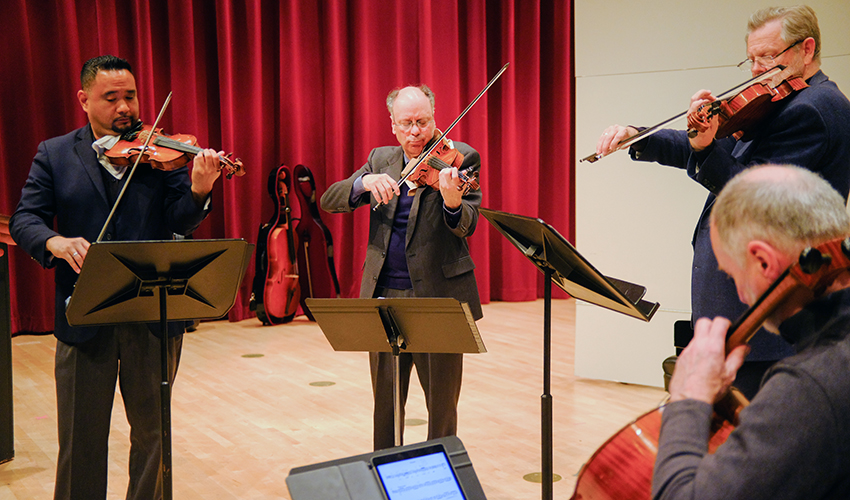SF State celebrates ‘disruptor’ Beethoven’s legacy 250 years after his birth

SF State’s quartet in residence, the Alexander String Quartet, rehearse with the Violins of Hope. These violins were owned by European Jews in World War II who were sent to concentration camps. Photo by Sreang Hok
Beethoven expert shares reasons to recognize the groundbreaking composer
If Ludwig van Beethoven were alive, he’d be getting ready to celebrate the sestercentennial (that’s Latin for 250th anniversary) of his birth in December. That party would require a cake with lot of candles. So San Francisco State University’s School of Music is marking the milestone a different way: with a roster of events that kicked off at the end of January and spans the Spring Semester.
Beethoven & Modernity recognizes the influence of the visionary composer and pianist through lectures, live performances, dance shows and a pop-up concert. The project, funded through San Francisco State’s College of Liberal & Creative Arts Extraordinary Ideas grant, is a collaboration between the departments of English Language and Literature, Jewish Studies and History and the schools of Theatre and Dance, Art and Music.
“This is an opportunity to acknowledge just how, across many disciplines, his legacy is not just enduring but very contemporary,” said Sandy Walsh-Wilson, cellist and founder of the University’s quartet-in-residence the Alexander String Quartet. An expert on the composer he’s dubbed a “disruptor,” Walsh-Wilson points to four reasons Beethoven continues to be revered around the world.
1. Beethoven championed the common man, Walsh-Wilson says. His Sinfonia Eroica (Heroic Symphony), also known as his third symphony, was about Napoleon. But right before its premiere, Napoleon crowned himself emperor of France. “This disgusted Beethoven, who thought of himself as a common man, so he scratched out the dedication page and instead wrote, ‘To the memory of a great man,’” Walsh-Wilson said.
2. Composers in the 18th century were high-class servants working in the employ of aristocrats. At that time, dukes and princes were the arbiters of taste. Beethoven resisted this. “He refused to use servants’ entrance anywhere. He would go through the front door and say, ‘I’m Beethoven.’ This was unprecedented,” Walsh-Wilson said. Beethoven also expressed his individuality through his songs — an unconventional notion for the time. “Composers were writing music that had to be popular, otherwise they wouldn’t get the next commission,” Walsh-Wilson said. “But Beethoven wrote what he wanted.”
3. Beethoven began to lose his hearing in the late 1700s and was completely deaf by 1814. Yet he wrote some of his most complex pieces in this period, Walsh-Wilson says. “You don’t have to hear music to imagine it,” he said. Beethoven’s tempo markings are nearly impossible to play, but he was uncompromising. “One of things we struggle with as musicians are his dynamic markings, where you have to play as loud as possible and then instantaneously as quietly as possible,” Walsh-Wilson said. Beethoven’s response to musicians’ complaints? Tough luck. “He’d famously say, ‘Do you think I care about your whiney little fiddle when the spirit moves me?’"
4. Composers still measure their success by Beethoven’s accomplishments. Few have bested his output, which includes 16 string quartets, 32 piano sonatas, nine symphonies and five piano concertos. “There was nothing that resembled the unimaginable expansion and unpredictability of the forms that Beethoven would write,” Walsh-Wilson said.
Beethoven & Modernity runs through Monday, May 4. See the full schedule of events on the School of Music website.